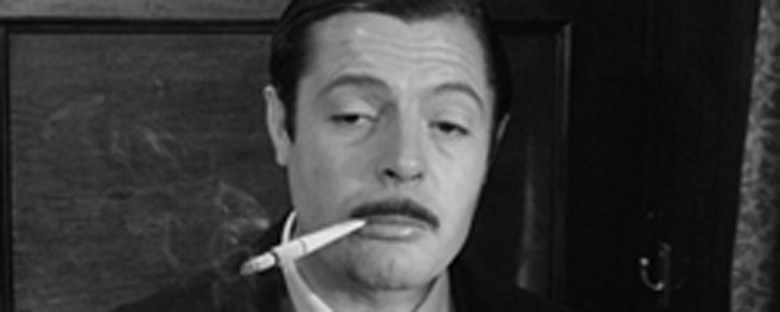Reviews
Divorzio all’italiana
Pietro Germi
Italy, 1961
Credits
Review by Rumsey Taylor
Posted on 27 April 2005
Source The Criterion Collection DVD
Related articles
Reviews: The White Sheik
A description of Marcello Mastroianni’s character in Divorce Italian Style should be totally familiar: he is married and in love with another woman, privileged yet unsatisfied, unfaithful and insincere—he is a man who looks and behaves as a man of his status should, yet this character’s drama becomes that of the film. He has come to epitomize the Italian aristocrat, and when armed with a manicured moustache that makes him look untrustworthy, the impression is cemented.
Mastroianni had a specific utility in his roles for Fellini, in each some substitute for the director, anchoring the films’ veiled autobiography. Even if his characters in Fellini’s films bear aspects that are identical to the conniving husband he plays here, Mastroianni is lent sympathy in a Fellini film—Pietro Germi allows the seasoned actor little here.
Late in the film, Ferdinando Cefalù (Mastrioanni) is at the brink of completing his scheme to off his needy wife. His plan requires a collective distraction, and it comes in the form of La Dolce Vita, released to a responsive, predominantly male crowd and a disapproving papacy which fails at encouraging a boycott. It is the most subversive jab at Mastrioanni’s chauvinist characters possible, circumstantial metaphysics in which the lecher is targeted by the very film he inhabits.
Cefalù thrives upon a loophole in the legal system that will allow him to dissolve his marriage, only if he kills his wife upon finding her with another man, engaging in some intimacy that compromises the honor of marriage. Conceptually, he will serve a brief prison sentence for his wife’s murder, and be set free to entertain his younger love interest—namely, Angela, his cousin. Each night he goes to sleep with his wife, Rosalia, satisfying her requests for him to say he loves her. Every time, she coyly responds, “How much?” Finally, he exits their bedroom in a storm, prepares a couch, and tends a bottle of wine in a gesture that confirms his plot to be the architect for his wife’s affair with some other man.
This dynamic elicits traits in Cefalù identical to his own affair with Angela, only the latter becomes the more ignored of his two immoral schemes. In inspiring his wife’s affair he is exacting: he selects and approves a man of adequate repute, invites him to the house for coffee, and shortly leaves him alone with his wife. In another room Cefalù listens to the pair’s increasingly illicit conversation, and records it on analog tape. There are no apparent oversights in this scheme, which is precisely why the viewer is to anticipate some flaw.
The fate of Cefalù’s wife is of little significance. His desire to rid himself of her loving nuisance is incessant, preoccupying his remaining affairs; if this scheme fails, there will be another. Above all the film is concerned with how this experience affects Cefalù: if he will be transformed or affected morally. The final image confirms Cefalù’s vanity, and also that villains seldom succeed in film.
We don’t do comments anymore, but you may contact us here or find us on Twitter or Facebook.



